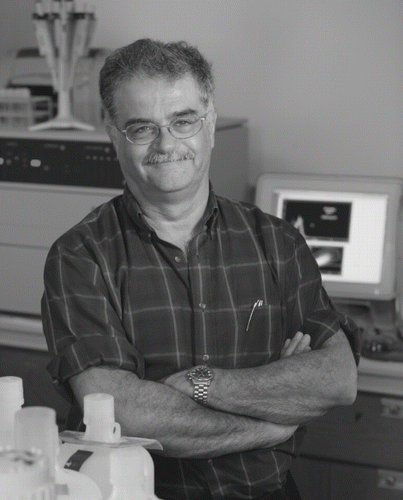Letter from the Editor
This issue is the sixth of the Immunological Investigations' thematic issues, entitled “Genetic Polymorphisms and Immune Responses.” Dr. Ernesto De Nardin is the guest editor of this issue and, as such, has provided a brief review article on this topic and invited the impressive selection of additional authors for this issue. The cover illustration was drawn by Nicole De Nardin, to represent the role of genetics in the immune response.
The choice of this topic was suggested by the numerous submissions along this theme that have been received in the last few years. The frequency of the submissions in this research area ensures that it is an area which will be of much interest. The articles that we have published in the past few years in this research area include: Normal cell surface expression and selective loss of functions resulting from Phe110 to Ser and Cys126 to Trp substitutuions in the formyl peptide receptor ([Namamori, Citation2004]) Polymorphism in the promoter region of the CD14 Gene and susceptibility to Brucellosis ([Haidari, Citation2006]), No Evidence of Association of CTLA-4 -318 C/T, 159 C/T, 3′ STR and SUMO4 163 AG Polymorphism with Autoimmune Diabetes ([Caputo, Citation2007]), Frequency of carriers of 8.1 ancestral haplotype and its fragments in two Caucasian populations (Kizel, 2007), Anti-cofactor autoantibodies in Systemic Lupus Erythematosus: prevalence, clinical and HLA associations ([Sebastiani, Citation2008]), HLA-class II alleles in Egyptian patients with hepatocellular carcinoma and CD14 Expression in the first 24h of sepsis: effect of -260C>T CD14 SNP ([Buktus de Aguilar, Citation2008]).
The guest editor, Dr. Ernesto De Nardin, is a longtime friend of mine. We both developed a passion for immunology as undergraduates at Syracuse University during a course taught by Justine Garvey, and both received some training at Roswell Park Cancer Institute (Ernie's doctorate, my post-doc). Ernie is the type of scientist and the type of professor that I am proud to have as a friend. He exemplifies the successful professor in the tripartite mission of research, teaching and service that I truly believe every professor should strive to fulfill. He has had continuous funding and nearly 50 publications in studies concerning inflammation. His current research involves studying genetic polymorphisms in genes responsible for inflammation.
His teaching mission includes the role of course director for the dental students' introductory microbiology and immunology courses, and he plays a major role in the similar course for the medical students. This teaching commitment continues with his role as director of the Masters program in Oral Sciences, and his role as a faculty advisor for 5 post-doctoral fellows, 5 doctoral students and 3 Master of Science students. His service activity on the school level includes his role on the admission committee for the dental school since 1993, and his role on various curriculum, promotion and hiring committees and fortunately for Immunological Investigations, his international resource includes, along with a role on the Editorial Board of The Journal of Periodontology, Annuals of Peridontology, and the International Journal of Oral Biology, a role as the Associate Editor of Immunological Investigations.
I hope that you enjoy the articles that follow, each of which shed light on the effect of genetic polymorphisms in different aspects of the immune response. I also hope that you will eagerly await next year's thematic issue on mucosal immunology, with Dr. Michael Russel and Dr. Pearay Ogra as guest editors.
REFERENCES
- Buktus de Aguilar B., Girard I., D'avila Paskulin D., de Franca E., Dornelles C., Suparregui Dias F., Bonorino C., Sampaio Alho C. CD14 Expression in the first 24h of sepsis: effect of -260C>T CD14 SNP. Immun. Invest. 2008; 37(8)753–769
- Caputo M., Cerrone G. E., Mazza C., Cedola N., Targovnik H. M., Gustavo D. F. No evidence of association of CTLA-4 -318C/T, 159 C/T, 3′STR and SUMO4 163 AG polymorphism with autoimmune diabetes. Immun. Invest. 2007; 36(3)259–270
- El-Chennawi F. A., Auf F. A., Metwally S. S., Mosaad Y. M., El-Wahab M. A., Tawhid Z. E. HLA-class II alleles in Egyptian patients with hepatocellular carcinoma. Immun. Invest. 2008; 37(7)661–674
- Haidari M., Hajilooi M., Rezazadeh M., Rafiei A., Alavi S. A., Keramat F. Polymorphism in the promoter region of the CD14 Gene and susceptibility to Brucellosis. Immun. Invest. 2006; 35(2)239–245
- Kiszel P., Kovacs M., Szalai C., et al. Frequency of carriers of 8.1 ancestral haplotype and its fragments in two Caucasian populations. Immun. Invest. 2007; 36(3)307–319, 2007
- Namamori M., He R., Sang H., Ye R. Normal cell surface expression and selective loss of functions resulting from Phe110 to Ser and Cys126 to Trp substitutuions in the formyl peptide receptor. Immunol. Invest. 2004; 33(2)193–212
- Sebastiani G. D., Morozzi G., Bellisai F., et al. Anti-cofactor autoantibodies in Systemic Lupus Erythematosus: prevalence, clinical and HLA associations. Immun. Invest. 2008; 37(4)375–383